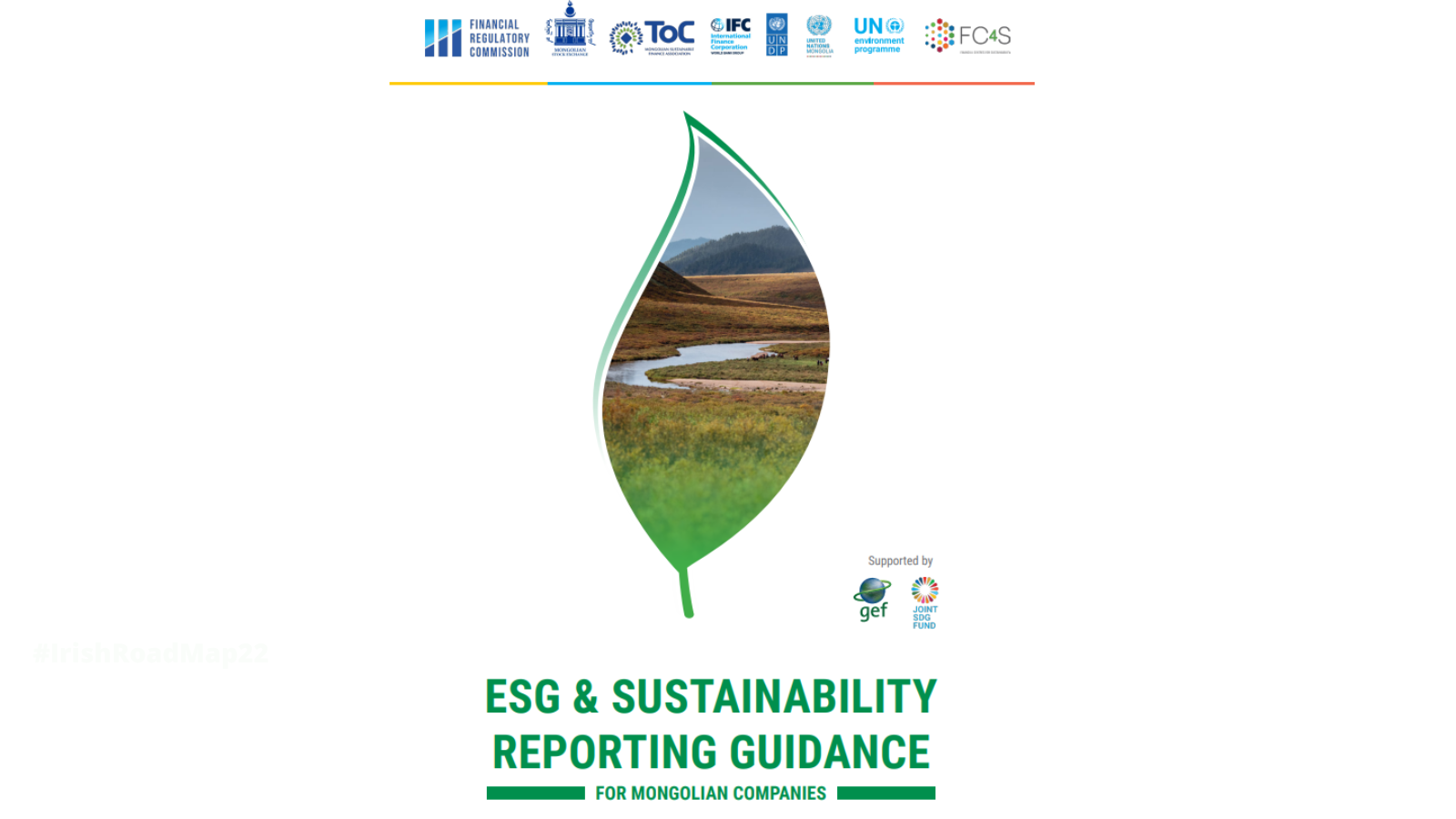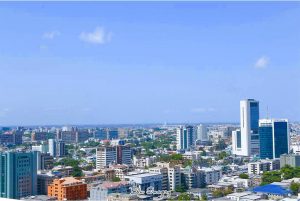Mongolia launches guidelines on corporate ESG and Sustainability reporting
ULAANBAATAR, Mongolia, August 2022 – Mongolia released today a set of guidelines to help listed companies, prospective issuers, and other interested companies disclose their sustainability practices.
The Sustainability Reporting Guidance for Mongolian Companies provides an overview of global sustainability reporting frameworks and trends, followed by an eight-step outline of how listed companies and other issuers can build the capacity to report on sustainability. Also included in the document are lists of indicators that companies can select from to fulfill their sustainability disclosure requirements.
Sustainability reporting is an organization’s practice of reporting publicly on its significant economic, environmental, and/or social impacts, in accordance with globally accepted standards. Such disclosures enable organizations to measure, understand and communicate their environmental, social, and governance (ESG) goals as well as a company’s progress toward them.
“By introducing this ESG disclosure and sustainability reporting guidance in line with international standards, we hope to harness good ESG management and disclosure market practice and help issuers and other financial institutions in creating long-term value that benefits the Mongolian financial market as a whole. We also believe that the public, investors, and stakeholders will benefit from improved transparency and disclosure practices” says Mr. Bayarsaikhan Dembereldash, Chairman of the Financial Regulatory Commission (FRC).
Efforts to integrate sustainability in financial analysis and investment globally are often hindered by a lack of quality ESG reporting data. This is also the case in Mongolia where, according to the analysis of a recent study, only 13% of companies listed on the stock exchange publicly disclosed their environmental indicators.
A recent survey of 42 companies listed on the Mongolian Stock Exchange (MSE) revealed that current reporting practices on sustainability issues is limited, with more information being disclosed on governance-related indicators compared to environmental and social ones (such as greenhouse gas emissions reduction and climate risks) due to lack of the technical knowledge and skills. The survey, however, noted that companies were willing to engage on sustainability reporting and believe the relevant information can be collected and disclosed if given the right guidance and capacity-building support.
The guidance suggests a set of key ESG indicators that companies should consider reporting on, and provides practical resources that companies can explore when preparing their sustainability reports. MSE-listed companies are expected to submit their first sustainability reports in 2023.
Listed issuers are strongly encouraged to refer to the guide in the implementation of sustainability practices, as well as annual reporting. Organizations that are not listed on the stock exchange can also use this document as a guide to assess their sustainability reporting practices and identify and address any gaps.
The Sustainability Reporting Guidance for Mongolian Companies was developed through a partnership between the FRC, MSE, MSFA, International Finance Corporation (IFC), UNDP-hosted Financial Centres for Sustainability Network (FC4S), United Nations Environment Programme (UNEP), United Nations Development Programme (UNDP) and United Nations (UN) Resident Mission in Mongolia, with support from the Global Environment Facility (GEF) and UN Joint SDG Fund.
Mr. Altai Khangai, the CEO of Mongolian stock exchange says “Adoption of ESG reporting standards in the capital market is a critical step in aligning business activities and private financing with the SDGs. The Mongolian Stock Exchange fully recognizes the role of the capital markets in mobilizing required financing for accelerating sustainable development and will continue working on creating an enabling market environment for ESG investment”.
“The goal of business and investors has shifted towards creating long-term stakeholder value and sustained growth,” says Orkhon Onon, Chairman of the Mongolian Sustainable Finance Association (MSFA). “This guidance will be key to aligning Mongolia’s financial system with sustainable development.”
“We know from our global and regional experience that investors are increasingly interested in the sustainability agenda. They are actively looking to see how companies are tackling issues such as climate change, gender diversity, or biodiversity and supply chain risks, all factors which impact a company’s bottom line. Regulators too are driving the agenda, as we’ve seen in Mongolia, as they recognize increased disclosure of environmental and social impacts is key to supporting the creation of sustainable capital markets, especially in today’s challenging environment,” said Kate Lazarus, IFC Senior ESG Advisory Lead for Asia Pacific. IFC has contributed to the adoption of 145 codes, laws, and regulations, 40 scorecards on corporate governance and sustainability, and 11 ESG reporting guidelines worldwide.
“The Government of Mongolia is taking important initiatives to revive the local economy and transform it in-line with sustainable development principles. As a main driver to thrive economies, businesses and private sector entities must commit to sustainable corporate practices, including improving its transparency and alignment with the Sustainable Development Goals. Therefore, the UN in Mongolia strongly encourages the Government of Mongolia to demonstrate its leadership in implementing the Integrated National Financing Framework and strategy with its reporting mechanism to catalyze transformative change and accelerate implementation of the SDGs for inclusive and sustainable development for all, which is envisaged in Mongolia’s Vision 2050,” said Mr. Tapan Mishra, UN Resident Coordinator in Mongolia.
UNDP Mongolia’s Resident Representative Ms. Elaine Conkievich emphasized the importance of the Sustainability Reporting Guidance and stated, “The adoption of ESG and sustainability reporting standards provides the private sector with the possibility to unlock a variety of opportunities and access potential investment opportunities while integrating sustainability factors into their business decisions and thus contributing towards achieving the SDGs.”
“Sustainability reporting offers a solution to the financial community’s growing demand for transparency and accountability. Targeting both listed and non-listed companies, this Guidance offers a practical reference, including frameworks and indicators, to assess their sustainability reporting practices, identify and address any gaps, and plan for continuous improvement. It highlights the relevance of true commitments through assigning roles and keeping these accountable at the firm level. In this way, its application will enable transparently informing external stakeholders and investors on ways in which a company is creating value over time and whether it is making a positive contribution to society” says Ms.Florencia Baldi, Head of FC4S & SIF Knowledge Hub.
“This guidance will help Mongolia’s capital market players adequately price sustainability risks and allocate capital accordingly,” says Camille Andre, Manager of the Green Finance Platform. “The Financial Stability Council’s endorsement reflects its commitment to transparency and market discipline.”
The Green Finance Platform will support Mongolia’s efforts to build dialogue and engagement around sustainability disclosure guidelines as part of the GEF-funded Aligning Finance Policies project. In addition, the project will support Mongolia’s efforts to advance the Mongolia Sustainable Finance Roadmap, which was approved by the Financial Stability Council (Ministry of Finance of Mongolia, Central Bank of Mongolia, Financial Regulatory Commission, Deposit Insurance Commission) at Mongolia’s first Green Finance Regional Forum in March 2022.










































